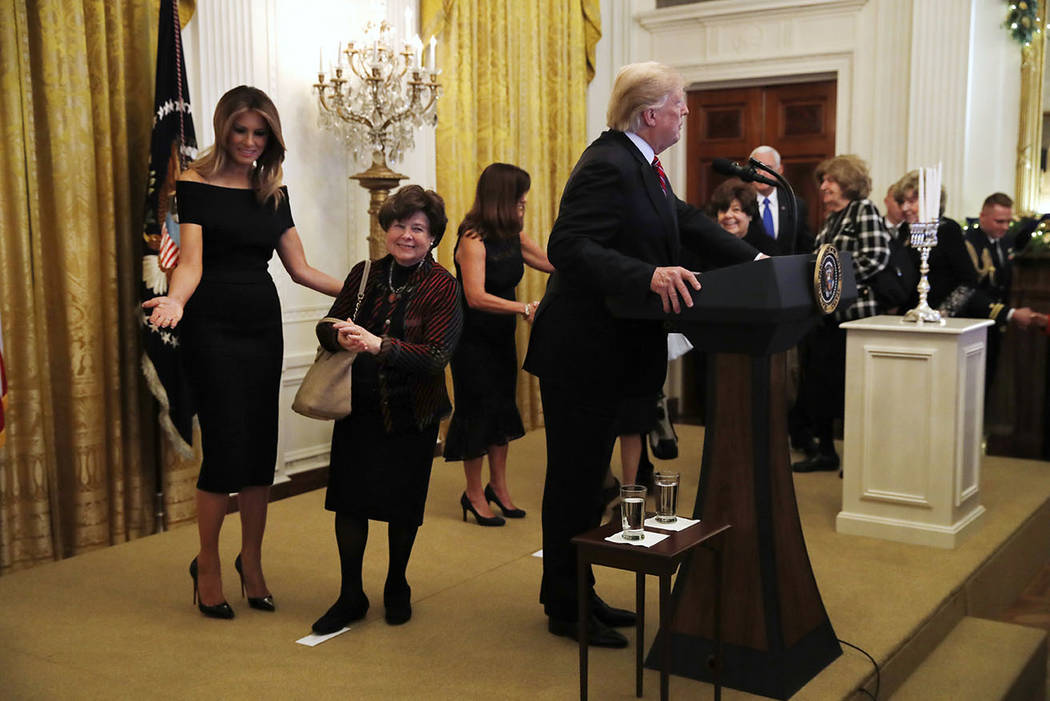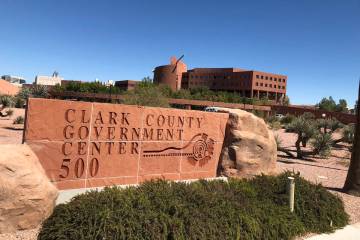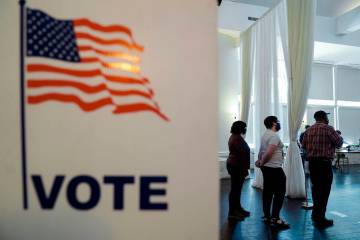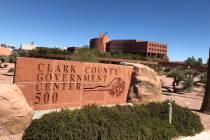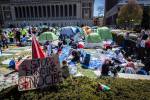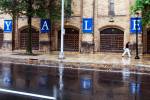Trump signs executive order targeting anti-Semitic acts on campus
WASHINGTON — President Donald Trump signed an executive order Wednesday to extend federal civil rights protections to Jewish college students subjected to anti-Semitic acts on campus, as he continued his bid to attract Jewish voters ahead of the 2020 election.
In an event that targeted anti-Israel sentiments at left-leaning college campuses, Trump signed the order during a packed afternoon Hanukkah celebration in the East Room, as he argued federal dollars should not bankroll “institutions that traffic in anti-Semitic hate.”
Noted civil libertarian Alan Dershowitz, a former Harvard Law professor, hailed the order as the most important event over his time in academia “to turn universities away from being bastions of hatred and discrimination.” He added, “It is a game-changer.”
The FBI found that Jews made up 58 percent of victims of hate crimes based on religion in 2018. Last year, 11 worshippers were killed at the Tree of Life synagogue in Pittsburgh, and another worshipper was shot to death in California.
And as Trump spoke, authorities were still investigating whether a shooting in a Jersey City, New Jersey, kosher market over the weekend was an anti-Semitic hate crime.
According to a senior administration official, the White House Domestic Policy Council began working on the order late last year “when we were alarmed, frankly, at a rise in anti-Semitic rhetoric, including, unfortunately, from leading political figures” and saw a spike in data on anti-Semitic incidents since 2013.
The administration has credited White House aide and presidential son-in-law Jared Kushner, a grandson of Holocaust survivors, for his role in pushing the measure.
The ACLU has opposed versions of the measure introduced in Congress on the grounds that they risk “chilling free speech of students on college campuses, and (are) unnecessary to enforce federal law’s prohibition on harassment in education.”
But the White House countered that the order is directed at behavior, not speech, and that the order sets the same standard to combat anti-Semitism that the Civil Rights Act sets to combat racial discrimination. It also includes language to avoid infringing on First Amendment rights.
“If a student on campus has been consistently called the ‘N-word’ by a classmate and then has a brick thrown through his window with the “N-word” on it, the brick going through the window is the actionable conduct, and the speech surrounding it is what suggests that that conduct was based on racial discrimination,” the administration official told reporters.
A statement by the Foundation for Individual Rights in Education recognized that the order included language to protect free speech but cautioned, “Having spent 20 years defending speakers from across the political spectrum, FIRE knows all too well that colleges and universities will rush to punish student and faculty speakers in an attempt to avoid federal investigation and enforcement.”
Specifically, the foundation warned the order could infringe on “constitutionally protected speech that is critical of Israel. (The vast majority of American campuses, public and private, receive federal funding and would be subject to the order.)”
The White House official told reporters that the BDS — Boycott, Divest, Sanctions — movement that seeks to isolate Israel economically “is not involved in the executive order that we’re putting forth tomorrow.”
But Trump touted his “firm stand” against the BDS movement, which has grown on American campuses. And a White House fact sheet noted that a pro-BDS resolution sponsored by Rep. Ilhan Omar, D-Minn., compared BDS to boycotting Nazi Germany.
While there has been bipartisan support for treating anti-Semitic acts as hate crimes, past efforts have not made it through Congress.
When a 2016 version of the anti-Semitism order was put to a vote in the Senate in 2016, it passed by unanimous consent by a vote of 99-0. But the measure never made it out of the House, for which the ACLU assumes some credit.
Even this year, lawmakers from both parties, including Reps. Doug Collins, R-Ga., and Ted Deutch, D-Fla., have introduced versions of the Anti-Semitism Awareness Act, which would add the international definition of anti-Semitism to the Civil Rights Act’s prohibition of discrimination based on “race, color or national origin.”
Deutch came out in support of the Trump order when he tweeted, “I’ve been clear that the government should adopt this useful tool. I’m glad that the Admin has taken this important step.” Collins was in the East Room on Wednesday.
The definition, adopted by the International Holocaust Remembrance Alliance in 2016, already has been adopted by the State Department and 31 other countries.
It reads: “Anti-Semitism is a certain perception of Jews, which may be expressed as hatred toward Jews. Rhetorical and physical manifestations of anti-Semitism are directed toward Jewish or non-Jewish individuals and/or their property, toward Jewish community institutions and religious facilities.”
But Jewish Democratic Council of America Executive Director Halie Soifer slammed Trump for having “zero credibility to take meaningful action to combat the scourge of anti-Semitism for which he is partially responsible.”
Her statement included video of Trump saying that there were “very fine people on both sides” at 2017 protests in Charlottesville, Virginia, where white nationalists chanted “Jews will not replace us” and a protester drove his car into a group of counterprotesters, killing a young woman, Heather Heyer.
The Republican Jewish Coalition has hailed Trump as “the most pro-Israel president ever.” During the signing ceremony, men wearing red yarmulkes with “TRUMP” on the back and the RJC logo on the front cheered Trump for recognizing Jerusalem as Israel’s capital and the Golan Heights as part of Israel.
Over the weekend, Trump addressed the Israeli American Council and said, “You have to vote for me, you have no choice” because of his support for Israel and Democrats’ support for taxes on the wealthy.
In March, Democratic pollster Mark Mellman told the Review-Journal that 76 percent of Jewish voters have an unfavorable view of Trump and that few Jewish voters will support Trump on the basis of his support of Israel.
Trump acknowledged Sheldon and Dr. Miriam Adelson, who have donated to Trump and the Republican Jewish Coalition, as they attended an evening Hanukkah event in the East Room.
Hanukkah starts on Dec. 22, but it is standard for the White House to hold Hanukkah celebrations early.
Contact Debra J. Saunders at dsaunders@reviewjournal.com or 202-662-7391. Follow @DebraJSaunders on Twitter.
The Review-Journal is owned by the family of Las Vegas Sands Corp. Chairman and CEO Sheldon Adelson.
I've read a draft of the White House executive order on the IHRA definition.
I've been clear that the government should adopt this useful tool.
I'm glad that the Admin. has taken this important step.https://t.co/pv2vjeGPSs
— Rep. Ted Deutch (@RepTedDeutch) December 11, 2019
https://platform.twitter.com/widgets.js



